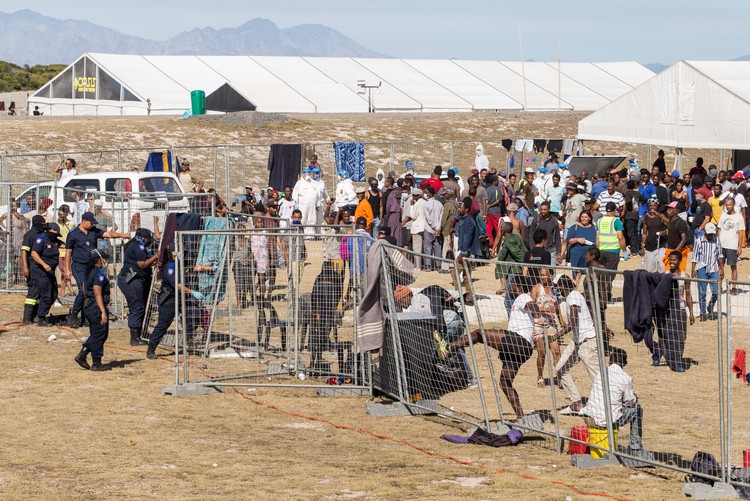Scathing report released on Cape Town’s homeless policies
The more than 400-page report was compiled by The Inkathalo Conversations and commissioned by the City in 2020
A new report has been released which often criticises the City of Cape Town’s policy to deal with homelessness. Archive Photo: Ashraf Hendricks
The City of Cape Town must review and amend all by-laws that criminalise homelessness without just cause. This was one of over 150 recommendations in a report into homelessness commissioned by the City.
The more than 400-page report was compiled by The Inkathalo Conversations (TIC). It criticises the local government’s current response to homelessness and questions its processes that produced the recent changes to City by-laws. It should be noted that the report was expected to be released over a year ago.
Recent changes to the City’s by-laws, passed on 29 September, appear to run contrary to the report’s recommendations, particularly those that fine homeless people for refusing offers of shelter.
The report covers eight general areas, including the criminalisation of homeless people, and the institutional drivers of homelessness. It also features “special reports” on what it calls homeless tax, and on the controversial Strandfontein Camp that was established by the City for local homeless people as a response to the Covid pandemic.
The report’s recommendations largely focused on amending the City’s 2013 Street People Policy, but also offered suggestions for national and provincial governments’ responses to homelessness.
Some of these include:
- The City of Cape Town and all other municipalities must review and amend all by-laws that criminalise homelessness without just cause
- Law Enforcement officers should be retrained for dealing with homelessness
- A R1 levy by all homeowners specifically for homelessness interventions
- The City’s ‘responsible giving’ campaigns should review their public communication, particularly as it is misleading, particularly about available bed space in the City
- An investigation into the Strandfontein homeless camp led by the Provincial Government and the South African Human Rights Commission
- 24-hour access to adequate and free ablution facilities, access to showers and waste facilities
- Safe and secure storage spaces for homeless people to store their personal belongings
- The creation of a social contract to alleviate and end homelessness
- Biennial research into homelessness that will “form the basis of all policy setting, strategy design, and planning work”
- The establishment of an inter-governmental agency focussed on homelessness
- Home Affairs should expedite issuing of national identity documents, birth certificates, and other civic registrations to homeless people
- The cost of applying for identity documents that have been confiscated by Law Enforcement activity should not be borne by homeless people
- The City of Cape Town should include homelessness as a criterion for emergency housing
- Do more to prevent homelessness before it arises
- A review of the options available to treat substance abuse
The report states, “It is our hope that the various role players … in the sector will take time to digest the report and provide their input …”
Ndifuna Ukwazi is currently litigating against the City in relation to its homeless by-laws.
The City has recently announced that it will approach the Constitutional Court to secure eviction orders against homeless tent encampments in the City, which are currently barred under the current Disaster Management Act.
Much of the report’s content is from the testimony of people who responded to the call for submissions. These include homeless and formerly homeless people, people working for homelessness relief and support organisations, and government officials.
According to the report, on 31 July 2020, “The City of Cape Town, through the office of Councillor Zahid Badroodien [Mayoral Committee Member for Community Services and Health], requested The Inkathalo Conversations to facilitate an independent ‘pre-public participation process’ that would provide recommendations that would improve the City’s policies and strategies to address homelessness.”
The Inkathalo Conversations did not respond to GroundUp’s questions by time of publication, so it is unclear what the precise legal status of the group is, its funding or what the City’s commitment to the outcomes were.
City Spokesperson Luthando Tyhalibongo told GroundUp, “The City is reviewing the Street People Policy, and will review the [report] during the process. More communication on the Street People Policy will be released by the incoming Mayoral Committee Member.”
Support independent journalism
Donate using Payfast

Next: Eastern Cape villagers want to know why a new road never reached them
Previous: Local manufacture of army’s new uniforms will create jobs
© 2021 GroundUp. This article is licensed under a Creative Commons Attribution-NoDerivatives 4.0 International License.
You may republish this article, so long as you credit the authors and GroundUp, and do not change the text. Please include a link back to the original article.
We put an invisible pixel in the article so that we can count traffic to republishers. All analytics tools are solely on our servers. We do not give our logs to any third party. Logs are deleted after two weeks. We do not use any IP address identifying information except to count regional traffic. We are solely interested in counting hits, not tracking users. If you republish, please do not delete the invisible pixel.

